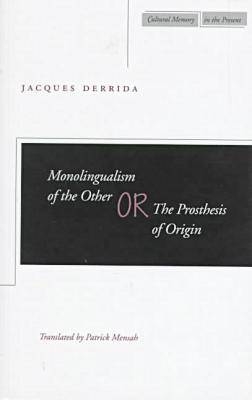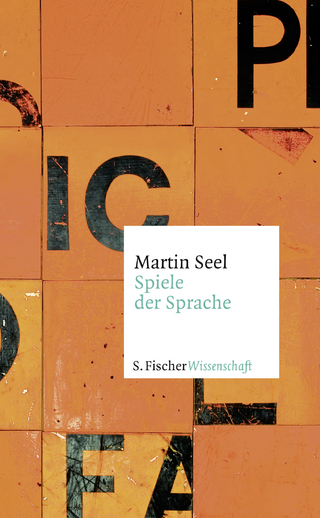
Monolingualism of the Other
Or, the Prosthesis of Origin
Seiten
1998
Stanford University Press (Verlag)
978-0-8047-3288-8 (ISBN)
Stanford University Press (Verlag)
978-0-8047-3288-8 (ISBN)
- Keine Verlagsinformationen verfügbar
- Artikel merken
This volume makes available in English leading philosopher, Jacques Derrida's reflections on the individual's relationship with his or her own language.
"I have but one language-yet that language is not mine." This book intertwines theoretical reflection with historical and cultural particularity to enunciate, then analyze this conundrum in terms of the author's own relationship to the French language. The book operates on three levels. At the first level, a theoretical inquiry investigates the relation between individuals and their "own" language. It also explores the structural limits, desires, and interdictions inherent in such "possession," as well as the corporeal aspect of language (its accents, tones, and rhythms) and the question of the "countability" of languages (that is, their discreteness or factual givenness). At the second level, the author testifies to aspects of his acculturation as an Algerian Jew with respect to language acquisition, schooling, citizenship, and the dynamics of cultural-political exclusion and inclusion. At the third level, the book is comparative, drawing on statements from a wide range of figures, from the Moroccan Abdelkebir Khatibi to Franz Rosenzweig, Gershom Scholem, Hannah Arendt, and Emmanuel Levinas.
Since one of the book's central themes is the question of linguistic and cultural identity, its argument touches on several issues relevant to the current debates on multiculturalism. These issues include the implementation of colonialism in the schools, the tacit or explicit censorship that excludes other (indigenous) languages from serious critical consideration, the investment in an ideal of linguistic purity, and the problematics of translation. The author also reveals the complex interplay of psychological factors that invests the subject of identity with the desire to recover a "lost" language of origin and with the ambition to master the language of the colonizer.
"I have but one language-yet that language is not mine." This book intertwines theoretical reflection with historical and cultural particularity to enunciate, then analyze this conundrum in terms of the author's own relationship to the French language. The book operates on three levels. At the first level, a theoretical inquiry investigates the relation between individuals and their "own" language. It also explores the structural limits, desires, and interdictions inherent in such "possession," as well as the corporeal aspect of language (its accents, tones, and rhythms) and the question of the "countability" of languages (that is, their discreteness or factual givenness). At the second level, the author testifies to aspects of his acculturation as an Algerian Jew with respect to language acquisition, schooling, citizenship, and the dynamics of cultural-political exclusion and inclusion. At the third level, the book is comparative, drawing on statements from a wide range of figures, from the Moroccan Abdelkebir Khatibi to Franz Rosenzweig, Gershom Scholem, Hannah Arendt, and Emmanuel Levinas.
Since one of the book's central themes is the question of linguistic and cultural identity, its argument touches on several issues relevant to the current debates on multiculturalism. These issues include the implementation of colonialism in the schools, the tacit or explicit censorship that excludes other (indigenous) languages from serious critical consideration, the investment in an ideal of linguistic purity, and the problematics of translation. The author also reveals the complex interplay of psychological factors that invests the subject of identity with the desire to recover a "lost" language of origin and with the ambition to master the language of the colonizer.
Jacques Derrida was Director of Studies at the Ecole des Hautes Etudes en Sciences Sociales, Paris, and Professor of Humanities at the University of California, Irvine. Among his books translated into English is Resistances of Psychoanalysis (Stanford, 1998).
Monolingualism of the other; or, The prosthesis of origin; Epilogue; Notes.
| Reihe/Serie | Cultural Memory in the Present |
|---|---|
| Übersetzer | Patrick Mensah |
| Verlagsort | Palo Alto |
| Sprache | englisch |
| Maße | 127 x 204 mm |
| Gewicht | 310 g |
| Themenwelt | Geisteswissenschaften ► Philosophie ► Sprachphilosophie |
| ISBN-10 | 0-8047-3288-4 / 0804732884 |
| ISBN-13 | 978-0-8047-3288-8 / 9780804732888 |
| Zustand | Neuware |
| Haben Sie eine Frage zum Produkt? |
Mehr entdecken
aus dem Bereich
aus dem Bereich
Macht und Legitimität politischer Sprache im Prozess der europäischen …
Buch | Softcover (2023)
Nomos (Verlag)
74,00 €
Wie die Menschheit zu ihrer größten Erfindung kam
Buch | Softcover (2022)
C.H.Beck (Verlag)
18,00 €


